Philatelic Commemorations of the Lincoln Assassination
Posted By Norman Gasbarro on February 23, 2015
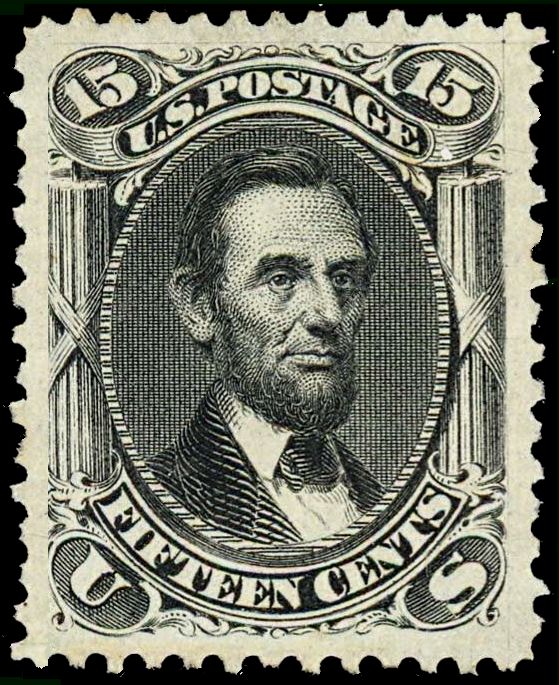
The first postal commemoration of the death of Abraham Lincoln was a black, fifteen cent stamp issued on the first anniversary of the assassination, April 1866. That stamp was described in a previous blog post entitled Early Postage Stamps Honoring Abraham Lincoln.
Beginning with the Civil War Centennial, 1961-1965, there was an increase in the number of philatelic commemorations of the Abraham Lincoln assassination, but these commemorations were in the form of covers with specially prepared cachets or souvenir cards, each cancelled with an appropriate date. Some of those items are presented below.
No postage stamp was issued by the U.S. Postal Service commemorating the 100th anniversary of the assassination.
——————————
Cancelled at Washington, D. C., 14 April 1865, recognizing the 100th anniversary of the assassination.
——————————–
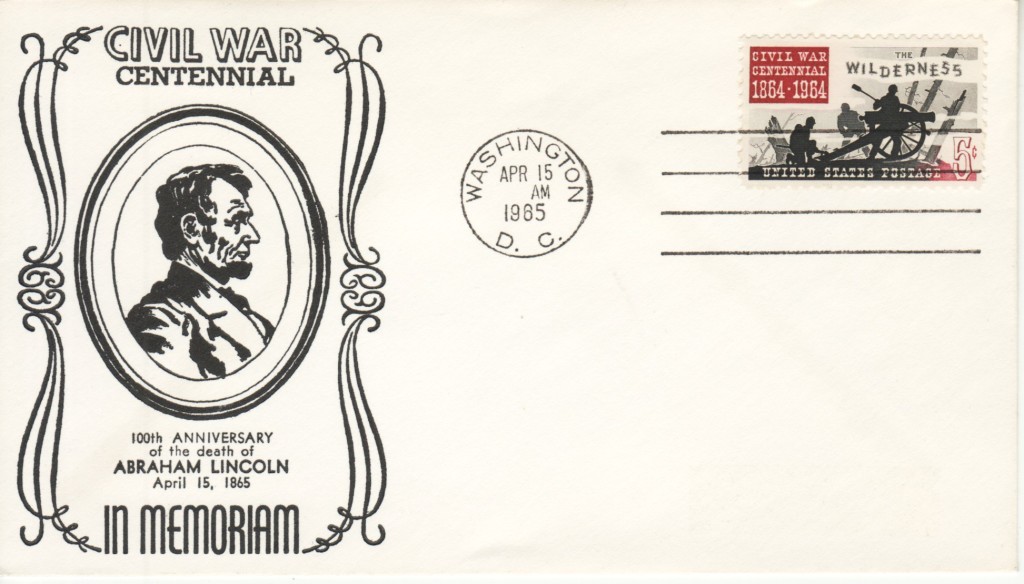 Cancelled at Washington, D. C., 15 April, recognizing the 100th anniversary of the death of Abraham Lincoln.
Cancelled at Washington, D. C., 15 April, recognizing the 100th anniversary of the death of Abraham Lincoln.
——————————–
There are known philatelic covers cancelled in each of the cities where the funeral train stopped on its way to Springfield, Illinois.
——————————–
Cancelled at Springfield, Illinois, 4 May 1865, recognizing the 100th anniversary of the burial of Abraham Lincoln.
————————–
A souvenir card issued at the Convention of the Lincoln Society of Philately, 17 May 1969, Louisville, Kentucky, recognizing the restoration of Ford’s Theatre in 1968 “as a shrine to the memory of Abraham Lincoln.” This card should have had a postage stamp specifically related to Lincoln or Washington, D.C., rather than the Apollo 8 stamp that was affixed to it and cancelled. Cards such as this one are a common issue at philatelic society meetings and usually bear some connection to the date, place or theme of the organization sponsoring them and are usually sold as a fund raiser for the event sponsors.
——————————–
This card was issued commercially as part of a series of American history events which depicted artists renditions of those events. One of the events was the Lincoln Assassination. The cancel is 15 April 1985, which is the 120th anniversary of the death of Lincoln, not of the assassination.
The text of the souvenir card reads:
Lincoln is Assassinated
What began as an enjoyable evening of theatre for President Abraham Lincoln and his wife Mary at the Ford Theatre in Washington, D.C., ultimately ended in tragedy. A fanatical, pro-South actor, John Wilkes Booth, fired the shot that mortally wounded the sixteenth President of the United States. Reverberations of shock and disbelief echoed through the land as his funeral train carried Lincoln to his Springfield, Illinois, burial site.
The untimely death of Lincoln on April 15, 1865, just five days after Lee surrendered to Grant at Appomattox, came at a time when the country needed him most. Reeling from the devastation of the Civil War, a battered people turned to Lincoln’s wisdom, common sense, kindliness and moderation to heal the deep rift of a divided nation.
The historic U.S. mint stamp on this Panel honors President Abraham Lincoln, a great statesman and humanitarian. It was issued in 1959.
—————————-
Special designed cancels are applied for through a local post office and do not necessarily indicate postal service approval of the event; any non-profit organization can apply for a cancel by submitting artwork through the local postmaster, which is what was done in early 2000, at Milford, Pennsylvania. On 14 April 2000, a controversy was raging at the Pike County Historical Society (PCHS) over a report that supposedly authenticated the “Lincoln Flag” at the Society museum in Milford, Pennsylvania. A crowd was drawn to the event at PCHS both by the controversy and the philatelic commemoration.
This flag has been the subject of a series of posts on this blog, concluding with a post entitled “The Lincoln Flag Hoax.” For a listing of all prior posts on the Lincoln Assassination, including those about this 36-star flag, click here:
The cover shown above is one of only ten (10) that was signed by both the cachet-cancel designer James Levell and the postmaster, Vincent Frisella. A total of 500 “officially” cacheted envelopes were cancelled at Milford on 14 April 2000 and an untold number of cancels were applied to covers without the “official” cachet on envelopes supplied by visitors to the museum and “Lincoln Flag Station” or interested persons who submitted their own covers to the Milford Post Office to have the cancel applied. After a grace period of 30 days, the cancel device was destroyed.
At the time, the “official” covers were sold for $3.00 each by the PCHS. It is not known at this time if any “official” covers still remain in inventory at the PCHS. Contact Lori for more information.
News release as published in the Pike County Dispatch on 13 April 2000:
Pike County Historical Society Event
Milford, Pennsylvania – 14 April 2000 marks the 135th anniversary of the assassination of Abraham Lincoln. To recognize this significant event in American History the Pike County Historical Society (PCHS) in conjunction with the United States Postal Service, Milford, Pennsylvania Post Office, is sponsoring a special cancellation which features a portion of a 36-star flag and the words “Lincoln Flag Station.”
The Columns Museum of PCHS is home to an important relic of our national heritage, “Lincoln Flag.” Many people believe that after President Lincoln was shot in the back of the head by John Wilkes Booth, the large flag which had been draped over the balustrade of the Presidential Box at Ford’s Theatre was used to cushion his head as he lay mortally wounded on the floor. This blood-stained flag was taken by a member of the cast of Our American Cousin, Mr. Thomas Gourlay. The Gourlay family kept the flag and passed it down two generations, first to daughter Jeannie Gourlay, also a member of the cast and witness to the assassination, and then to her son, Vivian Paul Struthers, who donated it to the Pike County Historical Society in 1954. Jeannie Gourlay Struthers moved to Milford, Pennsylvania in 1888 and brought the flag with her along with its secrets.
The “Lincoln Flag” is on permanent display at The Columns, 608 Broad Street, Milford, Pennsylvania. Museum hours are Wednesday through Sunday, from 1:00 to 4:00 p.m. A “Lincoln Flag Station” will be open from 2:00 p.m. through 5:30 p.m., with postal service employees applying the cancel to outgoing mail and favor cancels to patrons [on their] own philatelic mail. Admission to the Lincoln room will be free to all persons visiting “Lincoln Flag Station.” Interpreters will be present to tell the story of the flag and some of the research that has been done on it. For admission to the rest of the museum, a donation of $3.00 is requested for adults and fifty cents for children.
The PCHS will also sponsor its first cachet in commemoration of the assassination. The cachet is printed on the recently-released thirty-three cent Lincoln envelope and features a portrait of Abraham Lincoln surrounded by a Civil War motif and thirty-six star flags. Both the cachet and cancel were designed by Jim Levell, for him, also a first in both categories! This limited edition special commemorative envelope and cancel is available at The Columns Museum….
——————————
Personal Note: I made the application to the U.S. Postal Service for the cancel while I was serving as the Treasurer of PCHS in early 2000 and supervised the preparation of the covers for cancellation by the Milford Post Office. I also wrote and submitted the press release which was published in the Pike County Dispatch, the day before the event. In addition to the Pike County Dispatch, the same news release was sent to other area newspapers and to the philatelic press. In his column in Global Stamp News, Dennis Carman, described the controversy surrounding the Lincoln Flag and concluded that while the Society was sticking to its story of the flag’s authentication, “four years later there are still skeptics” and there are those who “consider the Lincoln flag story to be a very compelling legend that still requires authentication.” The covers and souvenir cards depicted in this blog post are from my own personal collection.
 ;
;
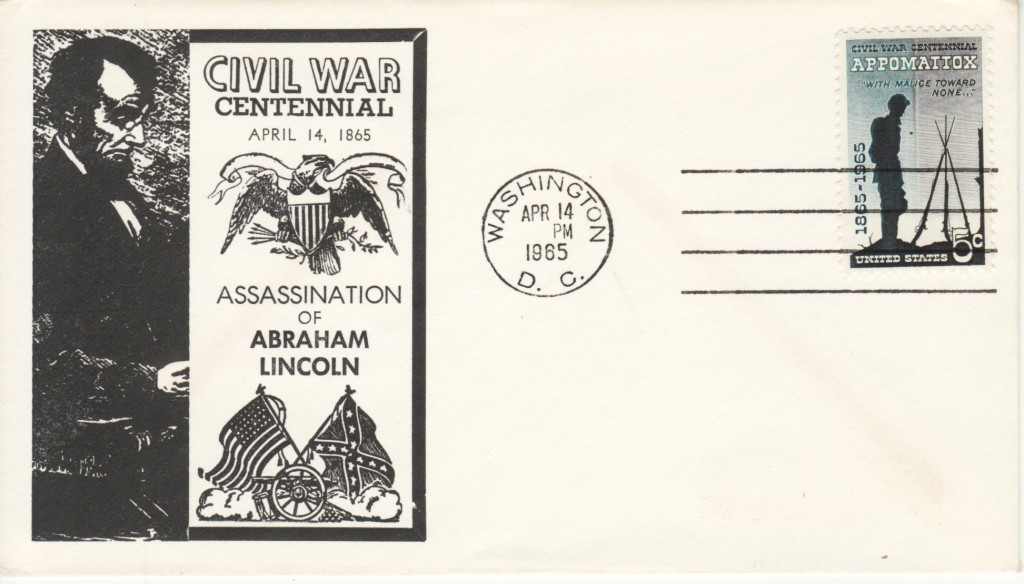
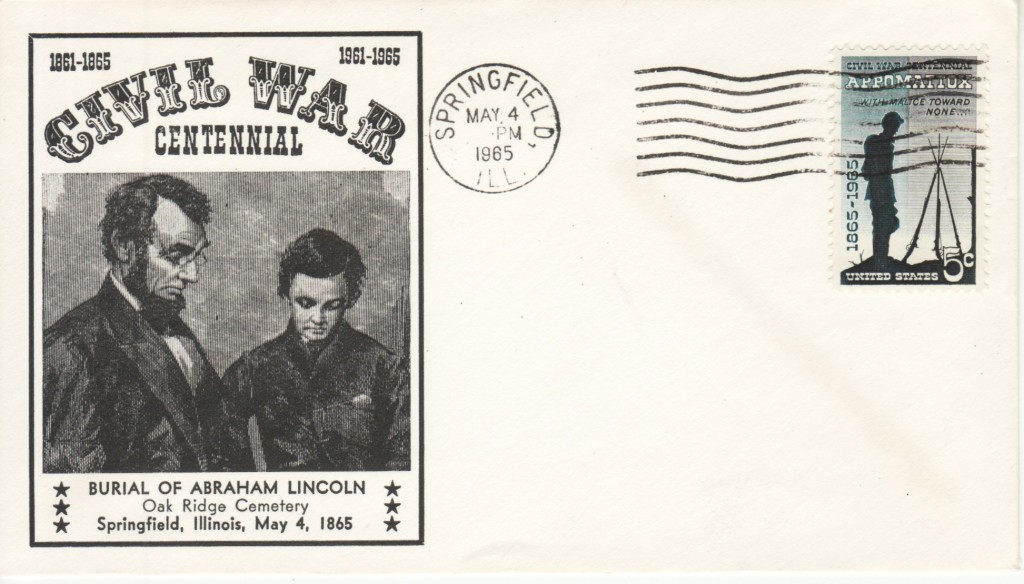
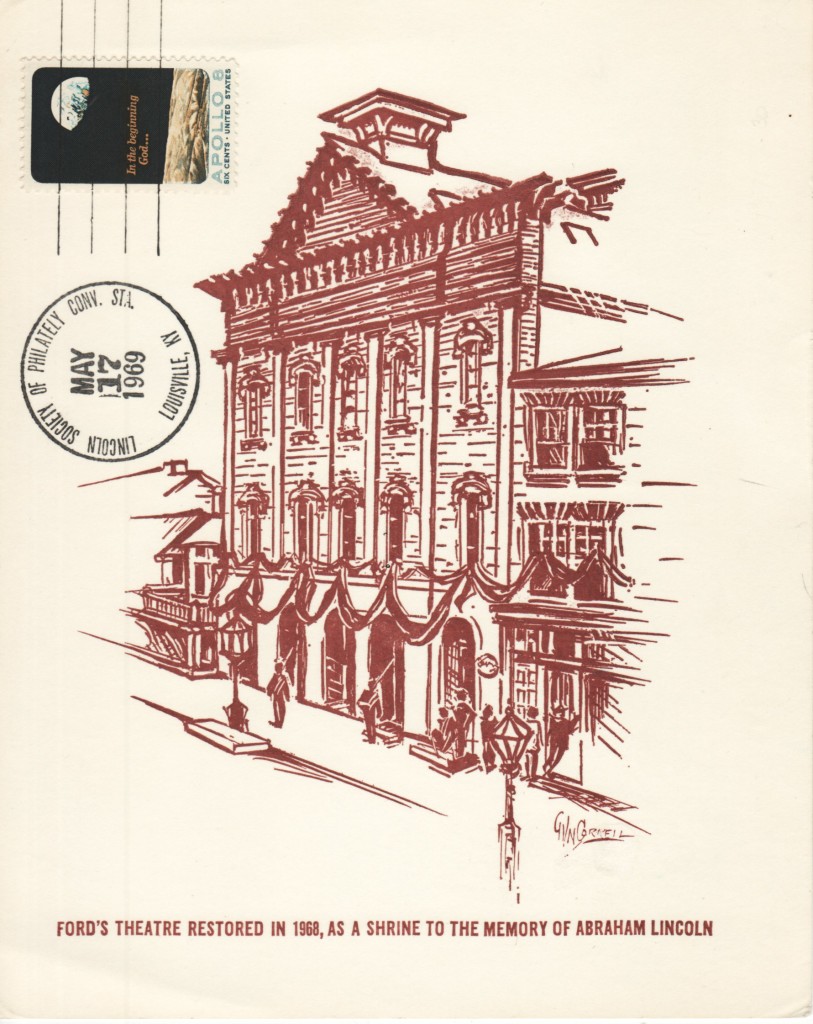
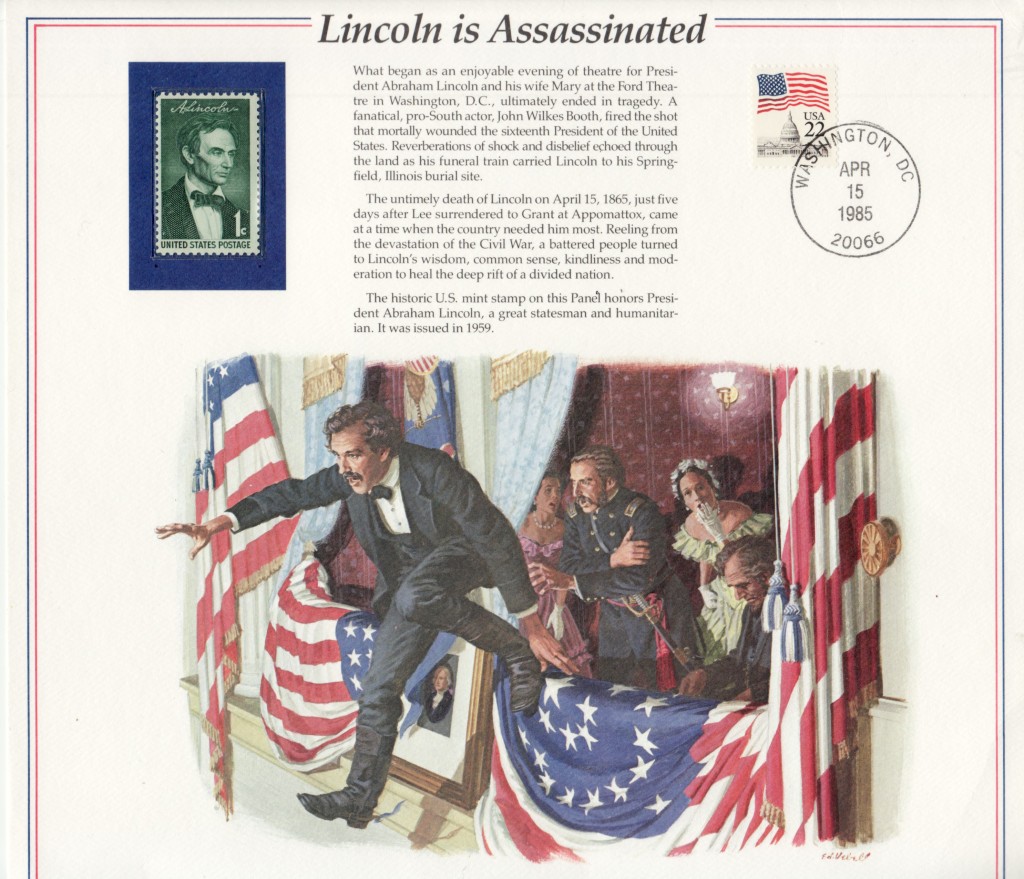
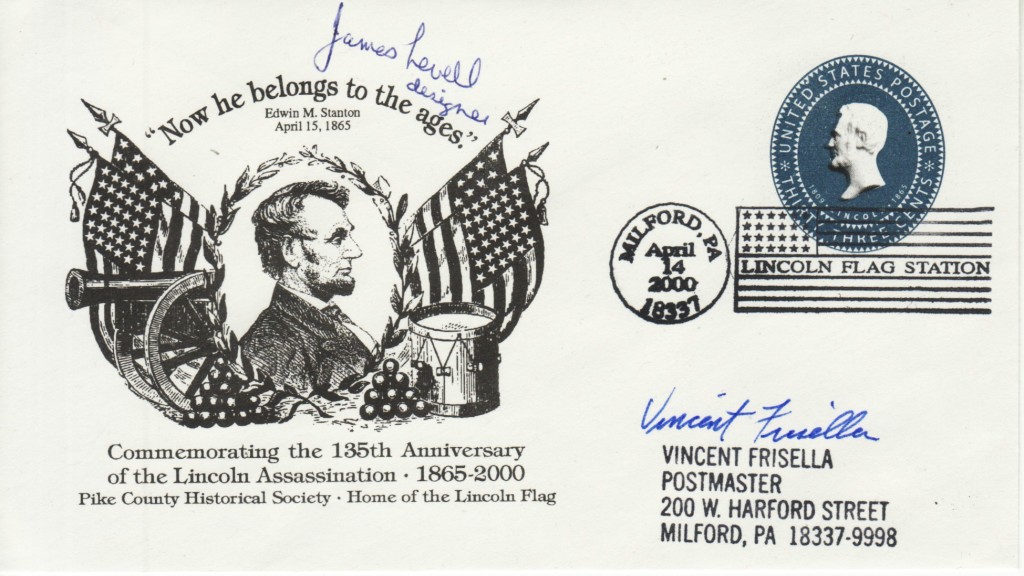


Comments